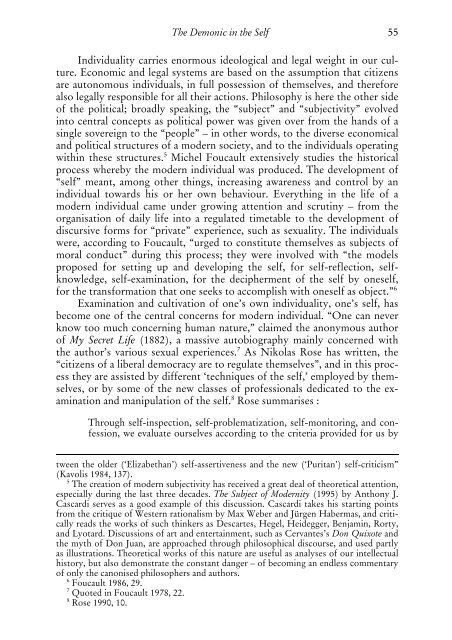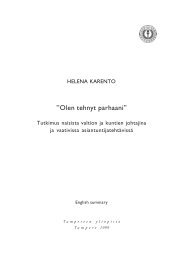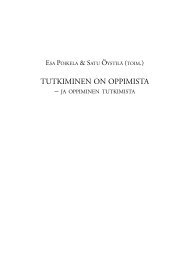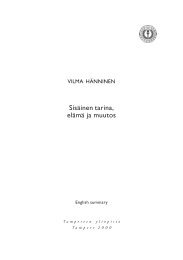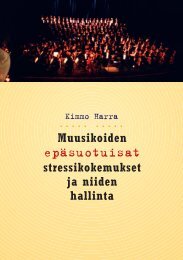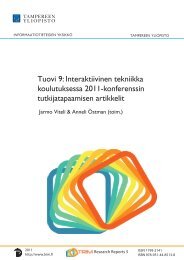Note on this edition: this is an electronic version of the 1999 book ...
Note on this edition: this is an electronic version of the 1999 book ...
Note on this edition: this is an electronic version of the 1999 book ...
Create successful ePaper yourself
Turn your PDF publications into a flip-book with our unique Google optimized e-Paper software.
The Dem<strong>on</strong>ic in <strong>the</strong> Self 55Individuality carries enormous ideological <strong>an</strong>d legal weight in our culture.Ec<strong>on</strong>omic <strong>an</strong>d legal systems are based <strong>on</strong> <strong>the</strong> assumpti<strong>on</strong> that citizensare aut<strong>on</strong>omous individuals, in full possessi<strong>on</strong> <strong>of</strong> <strong>the</strong>mselves, <strong>an</strong>d <strong>the</strong>reforealso legally resp<strong>on</strong>sible for all <strong>the</strong>ir acti<strong>on</strong>s. Philosophy <strong>is</strong> here <strong>the</strong> o<strong>the</strong>r side<strong>of</strong> <strong>the</strong> political; broadly speaking, <strong>the</strong> “subject” <strong>an</strong>d “subjectivity” evolvedinto central c<strong>on</strong>cepts as political power was given over from <strong>the</strong> h<strong>an</strong>ds <strong>of</strong> asingle sovereign to <strong>the</strong> “people” – in o<strong>the</strong>r words, to <strong>the</strong> diverse ec<strong>on</strong>omical<strong>an</strong>d political structures <strong>of</strong> a modern society, <strong>an</strong>d to <strong>the</strong> individuals operatingwithin <strong>the</strong>se structures. 5 Michel Foucault extensively studies <strong>the</strong> h<strong>is</strong>toricalprocess whereby <strong>the</strong> modern individual was produced. The development <strong>of</strong>“self” me<strong>an</strong>t, am<strong>on</strong>g o<strong>the</strong>r things, increasing awareness <strong>an</strong>d c<strong>on</strong>trol by <strong>an</strong>individual towards h<strong>is</strong> or her own behaviour. Everything in <strong>the</strong> life <strong>of</strong> amodern individual came under growing attenti<strong>on</strong> <strong>an</strong>d scrutiny – from <strong>the</strong>org<strong>an</strong><strong>is</strong>ati<strong>on</strong> <strong>of</strong> daily life into a regulated timetable to <strong>the</strong> development <strong>of</strong>d<strong>is</strong>cursive forms for “private” experience, such as sexuality. The individualswere, according to Foucault, “urged to c<strong>on</strong>stitute <strong>the</strong>mselves as subjects <strong>of</strong>moral c<strong>on</strong>duct” during <strong>th<strong>is</strong></strong> process; <strong>the</strong>y were involved with “<strong>the</strong> modelsproposed for setting up <strong>an</strong>d developing <strong>the</strong> self, for self-reflecti<strong>on</strong>, selfknowledge,self-examinati<strong>on</strong>, for <strong>the</strong> decipherment <strong>of</strong> <strong>the</strong> self by <strong>on</strong>eself,for <strong>the</strong> tr<strong>an</strong>sformati<strong>on</strong> that <strong>on</strong>e seeks to accompl<strong>is</strong>h with <strong>on</strong>eself as object.” 6Examinati<strong>on</strong> <strong>an</strong>d cultivati<strong>on</strong> <strong>of</strong> <strong>on</strong>e’s own individuality, <strong>on</strong>e’s self, hasbecome <strong>on</strong>e <strong>of</strong> <strong>the</strong> central c<strong>on</strong>cerns for modern individual. “One c<strong>an</strong> neverknow too much c<strong>on</strong>cerning hum<strong>an</strong> nature,” claimed <strong>the</strong> <strong>an</strong><strong>on</strong>ymous author<strong>of</strong> My Secret Life (1882), a massive autobiography mainly c<strong>on</strong>cerned with<strong>the</strong> author’s various sexual experiences. 7 As Nikolas Rose has written, <strong>the</strong>“citizens <strong>of</strong> a liberal democracy are to regulate <strong>the</strong>mselves”, <strong>an</strong>d in <strong>th<strong>is</strong></strong> process<strong>the</strong>y are ass<strong>is</strong>ted by different ‘techniques <strong>of</strong> <strong>the</strong> self,’ employed by <strong>the</strong>mselves,or by some <strong>of</strong> <strong>the</strong> new classes <strong>of</strong> pr<strong>of</strong>essi<strong>on</strong>als dedicated to <strong>the</strong> examinati<strong>on</strong><strong>an</strong>d m<strong>an</strong>ipulati<strong>on</strong> <strong>of</strong> <strong>the</strong> self. 8 Rose summar<strong>is</strong>es :Through self-inspecti<strong>on</strong>, self-problematizati<strong>on</strong>, self-m<strong>on</strong>itoring, <strong>an</strong>d c<strong>on</strong>fessi<strong>on</strong>,we evaluate ourselves according to <strong>the</strong> criteria provided for us bytween <strong>the</strong> older (‘Elizabeth<strong>an</strong>’) self-assertiveness <strong>an</strong>d <strong>the</strong> new (‘Purit<strong>an</strong>’) self-critic<strong>is</strong>m”(Kavol<strong>is</strong> 1984, 137).5 The creati<strong>on</strong> <strong>of</strong> modern subjectivity has received a great deal <strong>of</strong> <strong>the</strong>oretical attenti<strong>on</strong>,especially during <strong>the</strong> last three decades. The Subject <strong>of</strong> Modernity (1995) by Anth<strong>on</strong>y J.Cascardi serves as a good example <strong>of</strong> <strong>th<strong>is</strong></strong> d<strong>is</strong>cussi<strong>on</strong>. Cascardi takes h<strong>is</strong> starting pointsfrom <strong>the</strong> critique <strong>of</strong> Western rati<strong>on</strong>al<strong>is</strong>m by Max Weber <strong>an</strong>d Jürgen Habermas, <strong>an</strong>d criticallyreads <strong>the</strong> works <strong>of</strong> such thinkers as Descartes, Hegel, Heidegger, Benjamin, Rorty,<strong>an</strong>d Lyotard. D<strong>is</strong>cussi<strong>on</strong>s <strong>of</strong> art <strong>an</strong>d entertainment, such as Cerv<strong>an</strong>tes’s D<strong>on</strong> Quixote <strong>an</strong>d<strong>the</strong> myth <strong>of</strong> D<strong>on</strong> Ju<strong>an</strong>, are approached through philosophical d<strong>is</strong>course, <strong>an</strong>d used partlyas illustrati<strong>on</strong>s. Theoretical works <strong>of</strong> <strong>th<strong>is</strong></strong> nature are useful as <strong>an</strong>alyses <strong>of</strong> our intellectualh<strong>is</strong>tory, but also dem<strong>on</strong>strate <strong>the</strong> c<strong>on</strong>st<strong>an</strong>t d<strong>an</strong>ger – <strong>of</strong> becoming <strong>an</strong> endless commentary<strong>of</strong> <strong>on</strong>ly <strong>the</strong> c<strong>an</strong><strong>on</strong><strong>is</strong>ed philosophers <strong>an</strong>d authors.6Foucault 1986, 29.7 Quoted in Foucault 1978, 22.8Rose 1990, 10.


